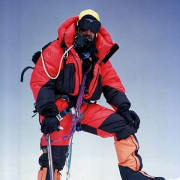Seeking Spiritual Permission From the Gods to Climb Himalayan Peaks

The Puja Ceremony
Climbing teams from the around the world have flocked to the mecca of mountaineering – the Himalayas, home of the 14 8,000-meter peaks. Expeditions are currently working their way up Mt. Everest, Cho You, Manaslu and other Himalayan peaks. Teams establish basecamps on these mountains, which serve as the operational hubs where climbers return time and again while acclimatizing and carrying loads to, and from, higher camps. Basecamp is relatively safe compared to the rotations on the upper mountain.
Every mountain presents varying challenges and stunning beauty, and each mountain is protected by different Gods and Goddesses. Climbers seeking to summit these peaks must request permission from the Gods and Goddesses protecting them. Individual ceremonies are held at the beginning of each expedition to seek permission, called the Puja Ceremony. The Puja Ceremony is a deeply spiritual and culturally significant event for Sherpas and climbers. The ceremony serves to honor the mountain's sacredness while seeking divine guidance and protection.
Adventure Consultants on Cho Oyu
Elite mountaineering company Adventure Consultants is on Cho Oyu, the 6th highest mountain in the world, and they just completed their Puja Ceremony. One of the team members recounted the power and beauty of the spiritual tradition. “The ceremony is so evocative. The scent of smoldering juniper, the sounds of the Lama’s recitals, bells and drums, and the bright colors of the prayer flags as they are strung over our camp. Prayer flags are blue, white, red, green and yellow – symbolizing the five elements of sky, air, fire, water and earth. The flags will stay up until our expedition is finished and prayers will be spread as the wind blows. We threw rice in the air as a blessing, and had tsampa flour rubbed on our faces to ask for a long life. We were individually blessed by the Lama and given a Kata, a white scarf to place around our necks.” – Adventure Consultants
The Lama - Buddhist Spiritual Leader
A Buddhist spiritual leader, typically a Lama, seeks blessings from the Gods, and asks the mountain deity for safe passage on the mountain. This spiritual observance sets the tone for the expedition. The Puja Ceremony is mandatory for Sherpa team members who hold deep religious beliefs tied to the world’s highest peaks. The Puja Ceremony is arranged by the Lama on an auspicious date. This day will hold significance relative to the Tibetan lunar calendar and factors including weather and the team’s climbing schedule. Participants include all climbing team members. The ceremony takes place at the base of the ‘Puja’. Here, the Lama prepares offerings for the Gods, which include food, beverages, juniper branches and other symbolic items laid out at the Puja. Such offerings are intended to appease the mountain deities while seeking blessings for a safe ascent and descent on the mountain.
The Khata Ceremony
The Lama leads prayers and chants invoking the blessings of the Gods. The Lama blesses Basecamp, as well as climbing gear items brought to the ceremony for blessing, by sprinkling holy water or rice over the camp and the items. Following these blessings, the Lama performs a Khata Ceremony. Khata are traditional Tibetan scarves, which participants offers to the Lama, symbolizing respect and gratitude. The Lama then blesses the Khata offerings, and returns the scarves to the participants, signifying the acceptance of their prayers.
White Beards and Juniper Branches
The final blessing takes place when the Lama applies white flour on the faces of the Puja participants, praying that each will grow old enough to grow a white beard. Blessed juniper branches are lit to purify the camp’s surroundings, and will remain lit anytime team members are on the upper mountain. When the Puja Ceremony has concluded, climbing teams are welcome to begin their upward journey on the highest mountains in the world – those protected by the Gods and Goddesses watching over them and those that dare to climb them.
